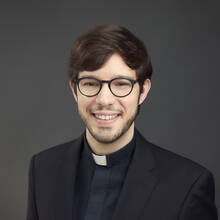I was visiting my parents on eastern Long Island when I learned that Sinéad O’Connor had died. From underneath my childhood bed, I pulled out a tub of old CDs and retrieved my copy of O’Connor’s 2007 album “Theology,” its jewel case still in its blue cardboard sleeve. I had purchased the album in the days before streaming music, as a junior in college studying abroad in Dublin that year. I would frequently pass by a music shop in the center of the city; not far from Trinity College’s Nassau Street gate, the shop was geared toward tourists. A giant poster for “Theology” hung in its window. The theology major in me was enticed. I had to hear it.
The collection was, I am guessing, one of O’Connor’s least popular—that is, least publicly accessible, by the standards of the contemporary music industry. (It’s still not available on Spotify.) “Theology” is the fruit of a class on the biblical prophets that O’Connor took with a Dominican priest, and—with the exception of a few cover tracks—contains Hebrew Bible texts that O’Connor rearranged and set to music. The album includes two CDs: one of faster-paced, slickly popified track; and another with unplugged, acoustic—one might say threadbare—versions. It was this latter lineup, the proverbial Side B, with which I became obsessed.
I can’t say that I was a long-time fan; I wouldn’t have recognized “Nothing Compares 2 U” if I’d heard it in passing. Maybe it was because I was raised on Irish folk music. Maybe it was because I was studying the Hebrew Bible in my university classes. Or because it was my first time living in another country. Or because I had few friends in my temporary home, and I felt alone. Sinéad O’Connor, through her “Theology” tracks, became my friend. And she helped teach me to pray.
I wanted “the boughs of the mighty” to be broken and “the weak” to be “clothed with strength,” as O’Connor cried in “The Glory of Jah,” her rendition of Hannah’s song from 1 Samuel 2. I still do not—and may never—know why she changed the word “bow” to “bough”—would God break the enemies’ branches in addition to their weapons? It hardly mattered. When she chanted “may the glory of Jah endure forever,” I wanted it, I believed it.
I wanted to make something beautiful for God, too, as she tentatively proffered in “Something Beautiful.” She sang of stealing a Bible on a long-ago Christmas Eve, confident of God’s forgiveness as she and God agreed “that it should have been free.” I agreed, too. And then—almost inexplicably, dialogically—the voice became the prophet’s, that of O’Connor’s beloved Jeremiah: “Now can a bride forget her jewels? Or a maid her ornaments? Yet, my people forgotten me…Who’ll dress their wounds?” It was somehow both clear and ambiguous: God’s speech and the petitioner’s speech simultaneously building upon one another, God inserting Godself into the narrative over dulcimer-like guitar.
Then there were the covers: the Rastafari-influenced “Rivers of Babylon,” a version of “I Don’t Know How to Love Him” from Jesus Christ Superstar, the haunting Gregorian chant at the end of the acoustic set.
She drew me, and she touched my heart.
When I look back, it probably wasn’t the most healthy choice to sit in my dark little dorm room listening to “Theology” over and over again, downing Nutella on cheap Tesco breadsticks, absorbing the prophets together with Sinéad’s haunting melodies. I could have been out making friends, sharing drinks with my classmates. But she drew me, and she touched my heart. I found healing in the words and in the feelings.
I felt God’s pathos: the trampled vineyard, the forgotten bride, the desire for relationship.
I felt the petitioner’s passion: in her darkness, in her longing, in the depths.
“Theology” is like Joni Mitchell’s “Blue,” if “Blue” had drawn exclusively from the Hebrew Bible, a combination that seems strange and impossible, beautiful and glorious. O’Connor had indeed made something beautiful for the One who could—who would—dress her wounds.
I saw Sinéad O’Connor in person once that year, at a Dublin music festival. I remember waiting for her in Phoenix Park, impatient for the other acts to finish. And I am embarrassed to admit that when she finally came onstage—a distant speck—and performed “We People Who Are Darker Than Blue” by Curtis Mayfield, another cover from “Theology,” I felt disappointed. I had wanted one of the slightly peppier tracks—wanted prophetic joy, and heard only prophetic lament. But she was teaching me something about what mattered—about the pursuit of justice in the face of evil, of the duty of accompaniment in the face of suffering, of the importance of song when lyres have been snatched. All these lessons would prove formative—as a Jesuit, as a priest, as a Christian.
And she was teaching me about her pain. Her pain, it seems, rarely lessened, but it undoubtedly coexisted with remarkable spiritual and musical depth. May her memory be a blessing, and may perpetual light shine upon her.




